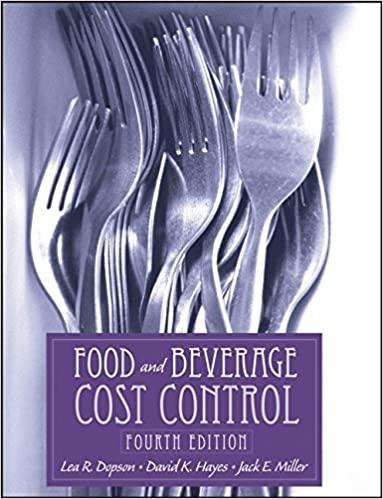Please answer the question 1,2 and (a)(b)(c)(d), thanks!

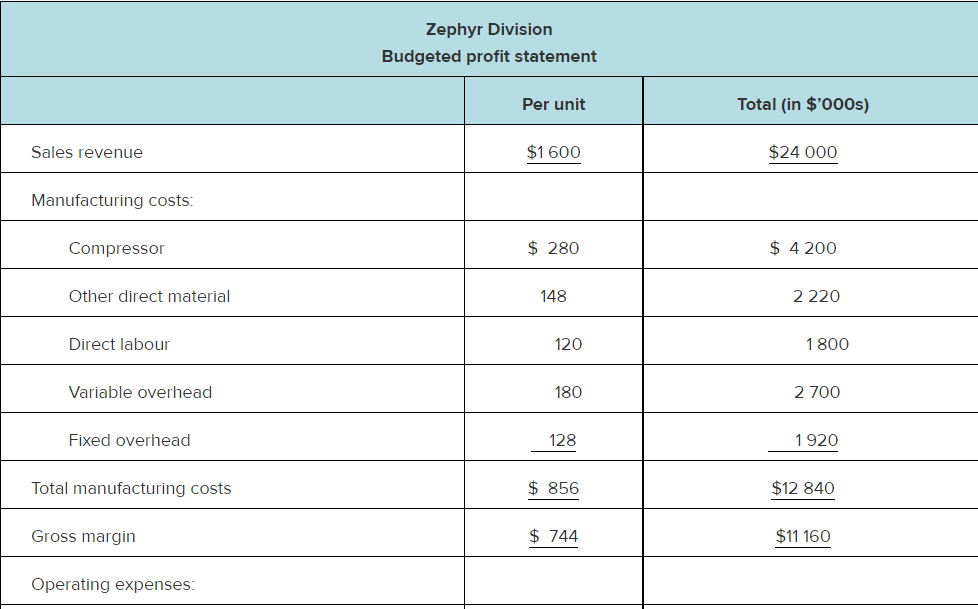

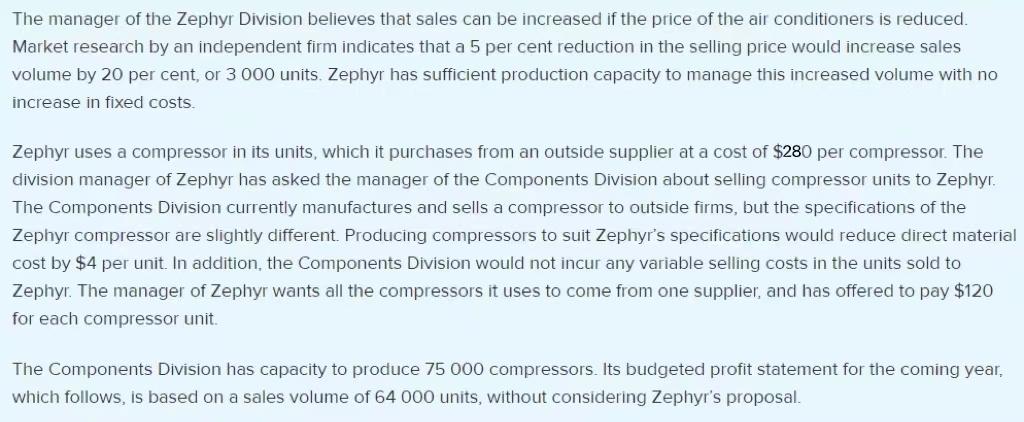
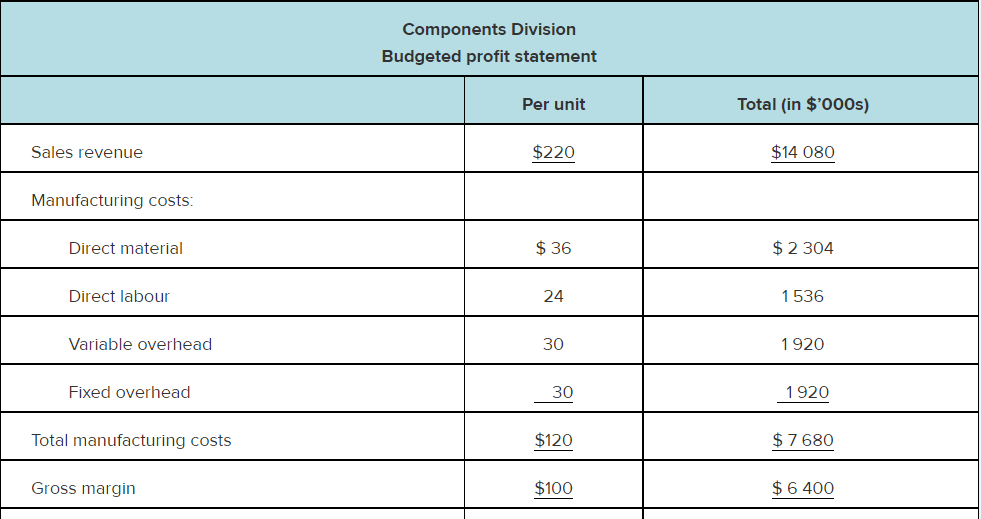


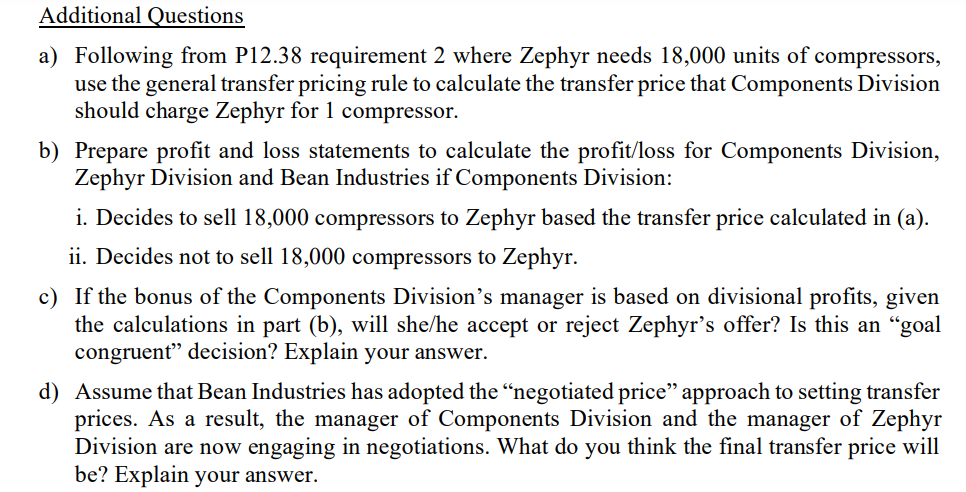
Bean Industries is a diversified corporation with separate operating divisions. Each division's performance is evaluated on the basis of profit and return on investment. The Zephyr Division manufactures and sells air-conditioning units. The coming year's budgeted profit statement, which follows, is based on a sales volume of 15 000 units. Zephyr Division Budgeted profit statement Per unit Total (in $'000s) Sales revenue $1600 $24 000 Manufacturing costs: Compressor $ 280 $ 4 200 Other direct material 148 2220 Direct labour 120 1800 Variable overhead 180 2 700 Fixed overhead 128 1920 Total manufacturing costs $ 856 $12 840 Gross margin $ 744 $11 160 Operating expenses: Variable selling $ 72 $ 1 080 Fixed selling 76 1 140 Fixed administrative 152 2280 Total operating expenses $ 300 $ 4500 Net profit before taxes $ 444 $ 6 660 The manager of the Zephyr Division believes that sales can be increased if the price of the air conditioners is reduced. Market research by an independent firm indicates that a 5 per cent reduction in the selling price would increase sales volume by 20 per cent, or 3 000 units. Zephyr has sufficient production capacity to manage this increased volume with no increase in fixed costs. Zephyr uses a compressor in its units, which it purchases from an outside supplier at a cost of $280 per compressor. The division manager of Zephyr has asked the manager of the Components Division about selling compressor units to Zephyr. The Components Division currently manufactures and sells a compressor to outside firms, but the specifications of the Zephyr compressor are slightly different. Producing compressors to suit Zephyr's specifications would reduce direct material cost by $4 per unit. In addition, the Components Division would not incur any variable selling costs in the units sold to Zephyr. The manager of Zephyr wants all the compressors it uses to come from one supplier, and has offered to pay $120 for each compressor unit. The Components Division has capacity to produce 75 000 compressors. Its budgeted profit statement for the coming year, which follows, is based on a sales volume of 64 000 units, without considering Zephyr's proposal. Components Division Budgeted profit statement Per unit Total (in $'000s) Sales revenue $220 $14 080 Manufacturing costs: Direct material $ 36 $ 2304 Direct labour 24 1536 Variable overhead 30 1920 Fixed overhead 30 1920 Total manufacturing costs $120 $ 7680 Gross margin $100 $ 6400 Operating expenses: Variable selling $ 18 $ 1152 Fixed selling 12 768 Fixed administrative 24 1536 Total operating expenses $ 54 $ 3456 Net profit before taxes $ 46 $ 2944 1. Should Zephyr institute the 5 per cent price reduction on its air-conditioning units even if it cannot acquire the compressors internally for $120 each? Support your conclusion with appropriate calculations. 2. Independent of your answer to requirement 1, assume that Zephyr needs 18 000 units. Should the Components Division be willing to supply the compressor units for $120 each? Support your conclusions with appropriate calculations. Additional Questions a) Following from P12.38 requirement 2 where Zephyr needs 18,000 units of compressors, use the general transfer pricing rule to calculate the transfer price that Components Division should charge Zephyr for 1 compressor. b) Prepare profit and loss statements to calculate the profit/loss for Components Division, Zephyr Division and Bean Industries if Components Division: i. Decides to sell 18,000 compressors to Zephyr based the transfer price calculated in (a). ii. Decides not to sell 18,000 compressors to Zephyr. c) If the bonus of the Components Division's manager is based on divisional profits, given the calculations in part (b), will she/he accept or reject Zephyr's offer? Is this an goal congruent decision? Explain your answer. d) Assume that Bean Industries has adopted the negotiated price approach to setting transfer prices. As a result, the manager of Components Division and the manager of Zephyr Division are now engaging in negotiations. What do you think the final transfer price will be? Explain your answer. Bean Industries is a diversified corporation with separate operating divisions. Each division's performance is evaluated on the basis of profit and return on investment. The Zephyr Division manufactures and sells air-conditioning units. The coming year's budgeted profit statement, which follows, is based on a sales volume of 15 000 units. Zephyr Division Budgeted profit statement Per unit Total (in $'000s) Sales revenue $1600 $24 000 Manufacturing costs: Compressor $ 280 $ 4 200 Other direct material 148 2220 Direct labour 120 1800 Variable overhead 180 2 700 Fixed overhead 128 1920 Total manufacturing costs $ 856 $12 840 Gross margin $ 744 $11 160 Operating expenses: Variable selling $ 72 $ 1 080 Fixed selling 76 1 140 Fixed administrative 152 2280 Total operating expenses $ 300 $ 4500 Net profit before taxes $ 444 $ 6 660 The manager of the Zephyr Division believes that sales can be increased if the price of the air conditioners is reduced. Market research by an independent firm indicates that a 5 per cent reduction in the selling price would increase sales volume by 20 per cent, or 3 000 units. Zephyr has sufficient production capacity to manage this increased volume with no increase in fixed costs. Zephyr uses a compressor in its units, which it purchases from an outside supplier at a cost of $280 per compressor. The division manager of Zephyr has asked the manager of the Components Division about selling compressor units to Zephyr. The Components Division currently manufactures and sells a compressor to outside firms, but the specifications of the Zephyr compressor are slightly different. Producing compressors to suit Zephyr's specifications would reduce direct material cost by $4 per unit. In addition, the Components Division would not incur any variable selling costs in the units sold to Zephyr. The manager of Zephyr wants all the compressors it uses to come from one supplier, and has offered to pay $120 for each compressor unit. The Components Division has capacity to produce 75 000 compressors. Its budgeted profit statement for the coming year, which follows, is based on a sales volume of 64 000 units, without considering Zephyr's proposal. Components Division Budgeted profit statement Per unit Total (in $'000s) Sales revenue $220 $14 080 Manufacturing costs: Direct material $ 36 $ 2304 Direct labour 24 1536 Variable overhead 30 1920 Fixed overhead 30 1920 Total manufacturing costs $120 $ 7680 Gross margin $100 $ 6400 Operating expenses: Variable selling $ 18 $ 1152 Fixed selling 12 768 Fixed administrative 24 1536 Total operating expenses $ 54 $ 3456 Net profit before taxes $ 46 $ 2944 1. Should Zephyr institute the 5 per cent price reduction on its air-conditioning units even if it cannot acquire the compressors internally for $120 each? Support your conclusion with appropriate calculations. 2. Independent of your answer to requirement 1, assume that Zephyr needs 18 000 units. Should the Components Division be willing to supply the compressor units for $120 each? Support your conclusions with appropriate calculations. Additional Questions a) Following from P12.38 requirement 2 where Zephyr needs 18,000 units of compressors, use the general transfer pricing rule to calculate the transfer price that Components Division should charge Zephyr for 1 compressor. b) Prepare profit and loss statements to calculate the profit/loss for Components Division, Zephyr Division and Bean Industries if Components Division: i. Decides to sell 18,000 compressors to Zephyr based the transfer price calculated in (a). ii. Decides not to sell 18,000 compressors to Zephyr. c) If the bonus of the Components Division's manager is based on divisional profits, given the calculations in part (b), will she/he accept or reject Zephyr's offer? Is this an goal congruent decision? Explain your answer. d) Assume that Bean Industries has adopted the negotiated price approach to setting transfer prices. As a result, the manager of Components Division and the manager of Zephyr Division are now engaging in negotiations. What do you think the final transfer price will be? Explain your














